 Petzlover
Petzlover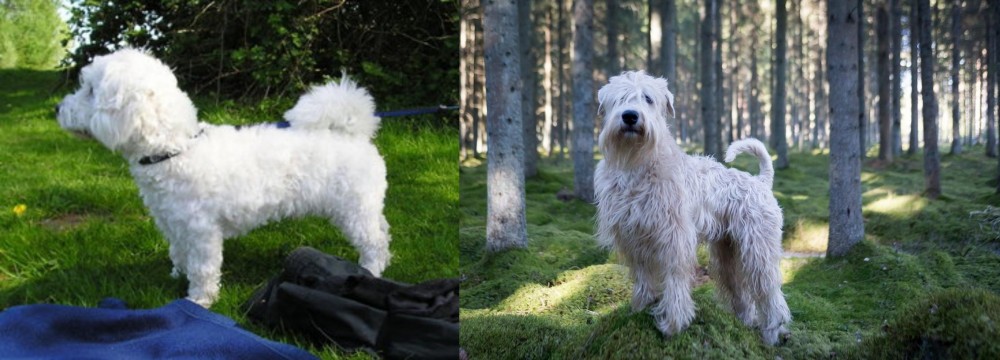 Franzuskaya Bolonka is originated from France but Soft-Coated Wheaten Terrier is originated from United Kingdom. Franzuskaya Bolonka may grow 23 cm / 9 inches shorter than Soft-Coated Wheaten Terrier. Franzuskaya Bolonka may weigh 15 kg / 33 pounds lesser than Soft-Coated Wheaten Terrier. Both Franzuskaya Bolonka and Soft-Coated Wheaten Terrier has almost same life span. Franzuskaya Bolonka may have less litter size than Soft-Coated Wheaten Terrier. Franzuskaya Bolonka requires Low Maintenance. But Soft-Coated Wheaten Terrier requires Moderate Maintenance
Franzuskaya Bolonka is originated from France but Soft-Coated Wheaten Terrier is originated from United Kingdom. Franzuskaya Bolonka may grow 23 cm / 9 inches shorter than Soft-Coated Wheaten Terrier. Franzuskaya Bolonka may weigh 15 kg / 33 pounds lesser than Soft-Coated Wheaten Terrier. Both Franzuskaya Bolonka and Soft-Coated Wheaten Terrier has almost same life span. Franzuskaya Bolonka may have less litter size than Soft-Coated Wheaten Terrier. Franzuskaya Bolonka requires Low Maintenance. But Soft-Coated Wheaten Terrier requires Moderate Maintenance
 The Franzuskaya Bolonka in France is known as the Tsvetnaya Bolonka in Russia and in Germany as the Bolonka Zwetna. All of these translate to Colored Bolognese. It is known as the “Pride of Russia” and was rediscovered by the Russians following the thaw of the Cold War. It is also sometimes translated as a colored lapdog.
The Franzuskaya Bolonka in France is known as the Tsvetnaya Bolonka in Russia and in Germany as the Bolonka Zwetna. All of these translate to Colored Bolognese. It is known as the “Pride of Russia” and was rediscovered by the Russians following the thaw of the Cold War. It is also sometimes translated as a colored lapdog.
The Bolonka is a rare breed in the toy category with ancestors in the Bichon Friese line. This little dog looks very much like the national dog of Cuba – the Havanese. In addition to the Bichon other small dogs in this ancestral line include the Shih Tzu, Toy Poodle, and Pekingese as well as the French, Italian and German Bolonka. They are often confused with the Bolognese as both breeds appear in various countries and have many similarities.
In all countries the common name for this dog is the Bolonka. They have a variety of names and nick names depending on the country. In addition to being the “Pride of Russia” he is called a Russian colored Bichon, Czechs call it the Bareyny Bolonsky, the Germans since 1980 have called it the Bolonka Zwetna but the Nordic Kennel Union does not recognize the Zwenta only the Russian Twetnaya.
The French version is seen to be the original with its ancestry dating back to the 18th century when Russian nobles were presented with a Bolonka by Louis XIV of France, and others migrated with the army of Napoleon to Russia. They were still known as the Bolonka of France. Small dogs were not popular in Russia due to the need for dogs that could work on farms and/or hunt. Particularly during the Soviet years, they were considered unnecessary. No Bolonkas were imported to Russia during the Soviet regime, so only localized breeding took place. The goal of breeders in the Soviet Union was to develop a toy dog, lap sized with an apartment living temperament.
During the cold war the Russians sent a pair of breeding Franzuskaya Bolonka to East Germany and they began to develop the breed there as well. At the same time the colored versions of the Bolonka were being bred. The Franzuskaya Bolonka is recognized by the Verband Dur Das Deutsche Hundewesen (VDF) while the other colored breeds are not. The white Bolonka is not recognized by the Federation Cynoloqique Internationale as a breed separate from the Bolognese but as simply another version. Individual clubs throughout the world recognized one or more versions of the Bolonka. They are thought to be the rarest within the Bichon family.
Today’s Bolonka is owed by Prince William and Princess Kate, giving the breed more publicity than it has had in many years.
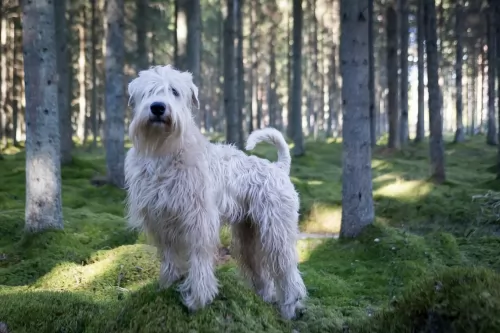 This wheaten colored terrier hails from Ireland. Although the Wheaten has been around for a long time, it was in 1937 that he was recognized as a breed in Ireland.
This wheaten colored terrier hails from Ireland. Although the Wheaten has been around for a long time, it was in 1937 that he was recognized as a breed in Ireland.
The British Kennel Club also recognized the Wheaten and the dog was also exported to the United States. Serious interest started being shown for the Terrier in the 1970s. It was in 1973 that they were recognised by the American Kennel Club.
 The Franzuskaya Bolonka is neither heavy boned nor fine boned. They are a toy breed with a moderate bone structure. The ears are neither long nor short and they have tails that touch the back at the tip. Like others in the Bichon family the Franzuskaya Bolonka does not shed. He is a sturdy little dog and the male has a distinct beard and moustache that the females of the breed do not. They have long coats that are wavy and curly. The Franzuskaya Bolonka is of course only white. The Russian version might be brown, red, black, wolf-gray, gray and of course white.
The Franzuskaya Bolonka is neither heavy boned nor fine boned. They are a toy breed with a moderate bone structure. The ears are neither long nor short and they have tails that touch the back at the tip. Like others in the Bichon family the Franzuskaya Bolonka does not shed. He is a sturdy little dog and the male has a distinct beard and moustache that the females of the breed do not. They have long coats that are wavy and curly. The Franzuskaya Bolonka is of course only white. The Russian version might be brown, red, black, wolf-gray, gray and of course white.
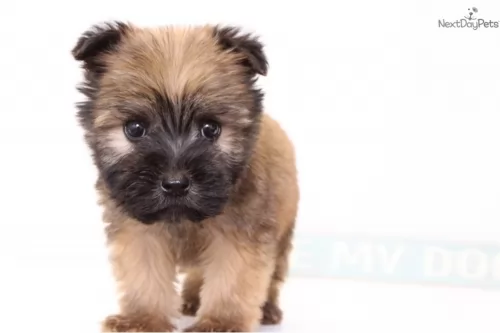 The Wheaten is a medium sized dog standing at between 43 and 50cm and weighing between 13 and 20kg both male and female. The coat of the dog is soft, silky and wavy to even curly and is a wheaten to ginger color.
The Wheaten is a medium sized dog standing at between 43 and 50cm and weighing between 13 and 20kg both male and female. The coat of the dog is soft, silky and wavy to even curly and is a wheaten to ginger color.
The coat of the puppy is dark but as he grows up it changes into the wheaten color although the ears may be a dark brown color. Pet owners like that the Wheaten is a very low shedding dog.
Playful, social and friendly, the Wheaten has always been put to good use on the farm. These days he is pet and companion. He is energetic and playful so children love having him around.
He is slightly more hyper and energetic than other Terrier breeds so will require a good dose of exercise.
He is smart and strong willed, and training and socialization turns him into an amicable pet to have around, so much so that he is sought after as a therapy-dog.
They’re easy-going dogs with no aggression issues but they still make great watch dogs and want to do whatever it takes to look after- and protect their human family.
 The Bolonka is great with kids, just avoid too intense play.
The Bolonka is great with kids, just avoid too intense play.
The Bolonka is a playful, lap dog with a lot of love to offer
Good adaptability great in the city in apartments and great in the country as well
They are very smart and love to learn. Being firm but beyond firm is also kind.
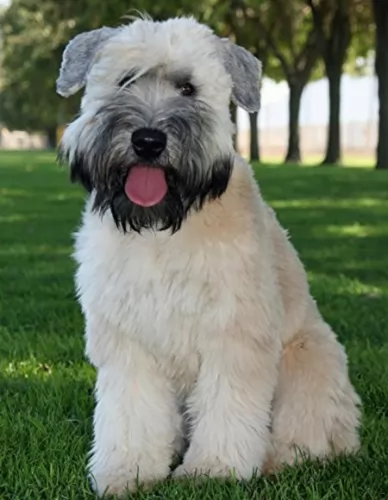 The Soft Coated Wheaten Terrier has always made an excellent farm dog, but today he is more suited as pet and companion.
The Soft Coated Wheaten Terrier has always made an excellent farm dog, but today he is more suited as pet and companion.
He adapts easily to life in the city or the countryside. Wherever he is, he will need his exercise. He also longs to be an active part of his human family, and then he’s happy, lively, social and friendly and is a great playmate for children.
 Medical issues are not fully documented because of the rarity of the breed and the years of isolation in the Soviet Union.
Medical issues are not fully documented because of the rarity of the breed and the years of isolation in the Soviet Union.
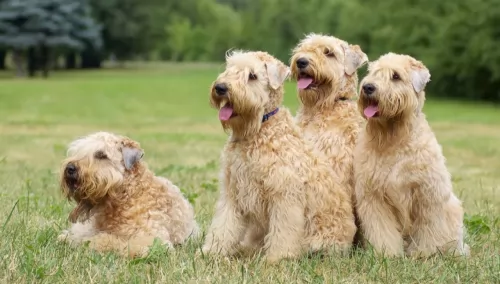 When you bring a Wheaten Terrier into your home, you’re not likely to have too many vet fees as he tends to be a healthy dog breed, being able to reach 13, 14 or 15 years of age with good care.
When you bring a Wheaten Terrier into your home, you’re not likely to have too many vet fees as he tends to be a healthy dog breed, being able to reach 13, 14 or 15 years of age with good care.
Look out for a dog ailment known as Protein-losing enteropathy (PLE). This is a condition where the dog isn’t able to properly absorb protein in the digestive tract, so that it is passed in their stools.
It can be fatal, but if caught early, some dietary changes can keep it under control.
Also, look out for inflammatory bowel disease. This disease occurs when the stomach of the dog has a large number of inflammatory cells which can change the lining of the digestive tract, preventing the normal absorption of food.
 Feed at least 3 meals a day. Feed one fourth of a cup daily split into three meals of a high quality puppy food.
Feed at least 3 meals a day. Feed one fourth of a cup daily split into three meals of a high quality puppy food.
Feed at least 2 meals per day. Feed one half of a cup daily split into two meals of a high quality dry food.
Fairly healthy breed due to isolation during cold war
The Franzuskaya Bolonka is developed as a lap dog but that does not mean he doesn’t need daily exercise. He loves to play but play gently and not for any length of time. They like to chase balls, play hide and seek and any tricks you want to teach them.
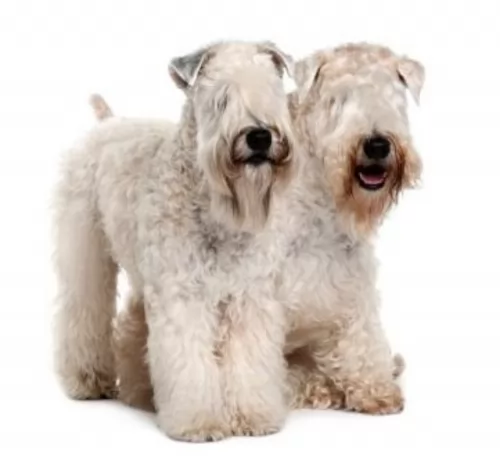 Brush your pet’s silky coat twice a week. Such a silky coat can get all tangled and matted. If you prefer, many people opt to rather have the Wheaten’s coat professionally clipped as then it is easier to handle. They like to have the hair clipped that hangs over the dog’s eyes.
Brush your pet’s silky coat twice a week. Such a silky coat can get all tangled and matted. If you prefer, many people opt to rather have the Wheaten’s coat professionally clipped as then it is easier to handle. They like to have the hair clipped that hangs over the dog’s eyes.
Other grooming tasks require you to check inside his ears for redness which could indicate an infection. Trim his nails and check him over for ticks and fleas.
Have your Wheatie trained and socialized as he is a stubborn dog breed and you want him to be well mannered and obedient.
Terriers like this are energetic dogs and he is going to need exercise every day. A walk for a dog is always a welcome experience as it gives him the opportunity to sniff around and pick up new smells. Play ball- or frisbee games with him as this can tire him out a bit.
If your dog shows signs of illness, get him to the vet. He is such a feisty dog that it can be unbearable to see him out of sorts.
Terriers are energetic dogs so if you feed your dog one of the commercial dog foods, make sure the label indicates what food it is. This is because the foods are manufactured according to the type of dog it is, its age, size and energy levels.
Always try and go for the high quality foods which don’t have all those unhealthy ingredients in them. Try to include some home-made food – nothing exotic and spicy – just plain, wholesome food that won’t upset his stomach.
Boiled chicken, brown rice or pasta and spinach, sweet potatoes and carrots is super tasty and nutritious. You can chop it up and add it to your pet’s kibble twice a week.
Try and include a little bit of raw meat to his diet occasionally as this can go towards ensuring he doesn’t get skin diseases. Always ensure he has a constant supply of fresh, cool water available.